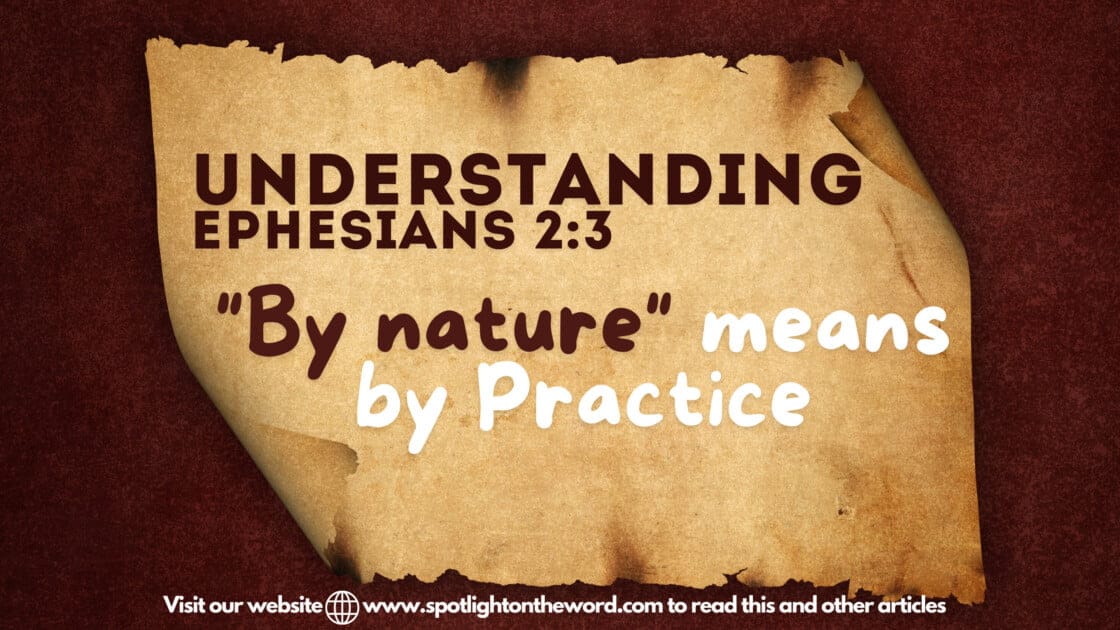Do You Still Pay Tithe?
By: Emmanuel Anokye Nsiah
Most people in Christendom today believe that they must pay tithe to avoid curses. Some believe that their blessings are in the tithe that they pay. Others also believe that not paying tithe as a Christian can make you miss Heaven. Is this the case? Or the Bible says otherwise?
What Is Tithe?
Tithe from the Hebrew language (ma`aser) simply means tenth part (1/10).
“Tithe is a tenth of the produce of the earth consecrated and set apart for a special purpose” (Easton, 1897).
“One tenth of farm produce given to the Levites to support them in their service” (Aboagye, 2018).
Tithe in The Bible
The first-time tithe was paid in the Bible was in Genesis 14:18-20. Abraham paid it to Melchizedek. This was not a command from God. He paid it as a free will giving. Later, Jacob made a vow to give a tenth of all what he will get to God (Gen 28:20-22). A vow is not a commandment.
Tithe became a command when the people of Israel were in the wilderness led by Moses (Num 18:21). The people of Israel started paying tithe when they got to the land of Canaan (Deut 12:5-11).
Tithe Is for The Levites
The Israelites were commanded to pay tithe to the Levites “…as an inheritance in return or the work which they perform, the work of the Tabernacle of meeting” Num 18:21 (cf. Joshua 14:1-5, Heb 7:5). God chose the tribe of Levi and their descendants to be the priests for the people (Num 17). It was sinful to make priests from different tribes (1 Kings 12:31, 1 Kings 13:33-34).
Priests Are Not Pastors, Preachers or Prophets
The work of priests, pastors, preachers and prophets are distinct and clearly stated in the Bible. Let us start by knowing their respective Twi names according to the Asante Twi Bible.
Priest = Osofo (Gen 14:18, Matt 8:4, 1 Pet 2:5,9)
Pastors = ahw3fo) (Eph 4:11)
Preacher = )s3nkafo) (Rom 10:14, 1 Tim 2:7, 2 Tim 1:11, 2 Pet 2:5)
Prophet = Odiyifo) (Eph 4:11, Acts 11:28)
Pastors and preachers are not ‘asofo)’ as many Ghanaians call them.
Priest
According to Thayer, “a priest is one who offers sacrifices and in general is busied with sacred rites”. This is what those who received tithe in the Old Testament did.
Pastor
Priests are not pastors. “Pastors guide as well as feed the flock; cp. Acts 20:28, which indicates that this was the service committed to elders (overseers or bishops)” (Vine, 1952). The office of pastors is the same as that of elders, overseers and bishops in the New Testament (1 Tim 3:1-7, Titus 1:5-9). Pastors never took tithe in the Bible.
Preacher
Again, priests are not preachers (evangelists). “An evangelist is “a messenger of good”, denotes a “preacher of the Gospel”, Acts 21:8; Eph 4:11, which makes clear the distinctiveness of the function in the churches; 2 Tim 4:5…Missionaries are “evangelists”, as being essentially preachers of the Gospel”. (Vine, 1952). No evangelist, preacher or missionary took tithe in the Bible.
Prophet
Lastly, priest are not prophets. Prophets prophesy. Prophets never received tithe in the Bible.
All Christians Are Priests
The old law has passed away. In the New Testament, all Christians are priests. We are a royal priesthood (1 Pet 2:5,9) and our High Priest is Jesus Christ (Heb 4:14; 9:11). If we are all priests in Christ, who is to pay tithe to who?
Tenth of the Tithe
When the Levites received tithe from their people (Israelites), they also gave a tenth of it. I do not see those who take ‘tithe’ today give tenth of what they receive to the Lord. They do not offer the heave offering.
“And the priest, the descendant of Aaron, shall be with the Levites when the Levites receive tithes; and the Levites shall bring up a tenth of the tithes to the house of our God, to the rooms of the storehouse” (Neh. 10:38).
“Speak thus to the Levites, and say to them: ‘When you take from the children of Israel the tithes which I have given you from them as your inheritance, then you shall offer up a heave offering of it to the Lord, a tenth of the tithe. 27 And your heave offering shall be reckoned to you as though it were the grain of the threshing floor and as the fullness of the winepress. 28 Thus you shall also offer a heave offering to the Lord from all your tithes which you receive from the children of Israel, and you shall give the Lord’s heave offering from it to Aaron the priest” (Num. 18:26-28).
Tithe Is Not Money
Food was given as tithe (Lev. 27:30-32, 2 Chron. 31:4-12). Tithe is not money. Tithe was brought to the storehouse not bank or treasury because it was farm produce (Neh. 12:44, Neh. 13:5,12, Neh. 10:38, Mal. 3:10).
“And all the tithe of the land, whether of the seed of the land or of the fruit of the tree, is the LORD’s. It is holy to the LORD” (Lev. 27:30).
“Moreover, he commanded the people who dwelt in Jerusalem to contribute support for the priests and the Levites, that they might devote themselves to the Law of the Lord. As soon as the commandment was circulated, the children of Israel brought in abundance the first fruits of grain and wine, oil and honey, and of all the produce of the field; and they brought in abundantly the tithe of everything. And the children of Israel and Judah, who dwelt in the cities of Judah, brought the tithe of oxen and sheep; also, the tithe of holy things which were consecrated to the Lord their God they laid in heaps” (2 Chro 31:4-6).
When Tithe Turned Money
There were places God chose for the Israelites to send the tithe in each tribe (Deut 12:10-14,17-19). But when the place was too far for them the tithe was then turned into money. This money was not given to the Levite or priest, but it was used to buy something for one’s own enjoyment (Deut 14:24-29). This shows that the people of Israel used money at that time. But note, money was never used to pay tithe.
Money appears 69 times in the Old Testament and 21 times in the Books of Moses (Genesis – Deuteronomy). Money was used to buy land (Gen 23:13-16), to buy food (Gen 43:2), for atonement (Ex 30:11-16) and other things (Deut 14:26). People also had jobs in the bible:
- Cooks (1 Sam 9:23-24)
- Judges (Luke 18:2, Judges 2:16)
- Governors (Gen 42:6, Dan 6:2)
- Carpenters & Masons (2 Sam 5:11)
- Physician/Doctor (Col 4:14)
- And more
But God commanded them to pay tithe with food not money (Lev. 27:30-32, 2 Chron. 31:4-12).
Tithe Was Paid Yearly
Tithe was paid annually/yearly (Deut. 14:22, Neh. 10:35-39). Every third year, tithe remained in the hometown and were given to the Levites, strangers, fatherless and widows (Deut. 14:28-29, Deut. 26:11-14). “This was often referred to as the ‘poor tithe’’ (Dickson, 2011). Tithe was not paid weekly, monthly or quarterly in the Bible. And I do not see today ‘pastors’ and ‘prophets’ preaching or giving tithe to the fatherless, strangers or widows.
“You shall truly tithe all the increase of your grain that the field produces year by year” (Deut. 14:22).
“At the end of every third year you shall bring out the tithe of your produce of that year and store it up within your gates. And the Levite, because he has no portion nor inheritance with you, and the stranger and the fatherless and the widow who are within your gates, may come and eat and be satisfied, that the Lord your God may bless you in all the work of your hand which you do” (Deut. 14:28,29).
The Tithe Law Has Passed Away
The New Testament confirms that tithe is for the Levites because they were the priests (Heb 7:5). The law concerning the priesthood which allowed the Levites to take tithe has been changed. In Christ we are all priests. The law that permitted them (Levites/priests) to take tithe has been changed (Heb 7:12). Christians do not pay tithe. Christians are not under the old law (2 Cor 3:5-7, Heb 8:6-13). Tithe was classified with other offerings (burnt offering, sacrifices, heave offering, vowed offering, freewill offering, grain offering) in the Old Testament (Deut 12:6, Neh 12:43,44, Neh 13:5). If all these offerings have passed away, then tithe too has passed away.
“And indeed, those who are of the sons of Levi, who receive the priesthood, have a commandment to receive tithes from the people according to the law, that is, from their brethren, though they have come from the loins of Abraham” (Heb 7:5).
“For the priesthood being changed, of necessity there is also a change of the law” (Heb 7:12).
Malachi 3:7-10
“Will a man rob God? Yet you have robbed Me! But you say, ‘In what way have we robbed You? ‘In tithes and offerings. You are cursed with a curse, for you have robbed Me, Even this whole nation. Bring all the tithes into the storehouse, that there may be food in My house, and try Me now in this, “Says the Lord of hosts, “If I will not open for you the windows of heaven and pour out for you such blessing That there will not be room enough to receive it” (Mal 3:8-10).
Modern-day ‘pastors’ and ‘prophets’ quote Malachi 3:7-10 to receive tithe from their members. They quote verses eight (8) and nine (9) to put fear in their members. They forget that the book of Malachi is in the Old Testament. The book was written to the people of Israel to remember the laws of Moses (Mal 4:4, Mal 1:1). The book was not written to Christians hence the laws in it are not for Christians. The same book talks about animal and food sacrifices which these modern-day ‘pastors’ and ‘prophets’ do not talk about (Mal 1:7,8, Mal 2:13).
Also, quoting Mal 3:7-10 to receive money from your members is also not consistent. The tithe in the passage is sent to the storehouse not treasury or bank (verse 10). The passage continues to say “…that there may be food in My house…” not money in my house. This is clearly what Paul said:
“Now I urge you, brethren, note those who cause divisions and offenses, contrary to the doctrine which you learned, and avoid them. For those who are such do not serve our Lord Jesus Christ, but their own belly, and by smooth words and flattering speech deceive the hearts of the simple” (Romans 16:17-18).
Lastly, the passage was to “…this whole nation” (verse 9). Which nation? The nation of Israel (Mal 1:1; 1:5; 2:11; 2:16; 4:4).
Tithe in The New Testament
Only four passages in the New Testament talk about tithe, Mtt 23:23, Lk 11:42, Lk 18:12 and Heb 7:5,6,8,9. Heb 7 has already been discussed. Mtt 23:23 and Lk 11:42 are parallel passages and Lk 18:12 on the other hand is a parable.
Luke 18:9-14 is a parable about a pharisee and a tax collector. Verses 11 and 12 is about what the pharisee (a Jew) said in his prayer. This has nothing to do with Christianity.
Mtt 23:23/Lk 11:42 too was a rebuke to the scribes and pharisees not Christians. In the text, Jesus Christ also confirms that tithe is farm produce (mint, anise and cumin…these are herbs).
Lastly, Heb 7 also confirms that tithe is for the Levites (verse 5) and the law has passed away (verse 12).
Christian Giving
Christians give willfully and cheerfully (2 Cor 9:6-9, Luke 6:38,39) on every first day of the week/Sunday (1 Cor 16:1,2). This is the source of income of the church.
“But this I say: He who sows sparingly will also reap sparingly, and he who sows bountifully will also reap bountifully. So, let each one give as he purposes in his heart, not grudgingly or of necessity; for God loves a cheerful giver. And God is able to make all grace abound toward you, that you, always having all sufficiency in all things, may have an abundance for every good work” (2 Cor 9:6-8).
“Now concerning the collection for the saints, as I have given orders to the churches of Galatia, so you must do also: On the first day of the week let each one of you lay something aside, storing up as he may prosper, that there be no collections when I come” (1 Cor 16:1,2).
Conclusion
All have been said. The Bible is clear on this: Christians do not pay tithe. Do not just accept anything from the pulpit. Be like the Bereans for “… they received the word with all readiness, and searched the Scriptures daily to find out whether these things were so” (Acts 17:11). “Therefore, my beloved, as you have always obeyed, not as in my presence only, but now much more in my absence, work out your own salvation with fear and trembling” (Phil 2:12).
Visit the church of Christ near you.
Works Cited
All Bible passages are quoted from the New King James Version of the Bible
Aboagye, Jeff. (2018), Are Christians Under Any Obligation to Pay Tithe?
Dickson, Roger E. (2011), Tithing Vs Free Will (Cape Town).
Easton, M. G., ed. (1897), Illustrated Bible Dictionary… (also known as Easton’s Bible Dictionary) (3rd ed.), London: T. Nelson & Sons.
Thayer, Joseph H. (1894), A Greek-English Lexicon of the New Testament (New York: Harper & Brothers, Franklin Square).
Vine, W. E. (1952), An Expository Dictionary of New Testament Words (Old Tappan, NJ: Revell).






